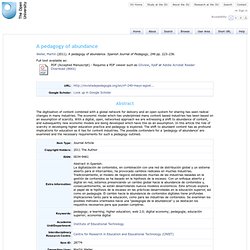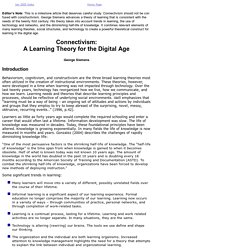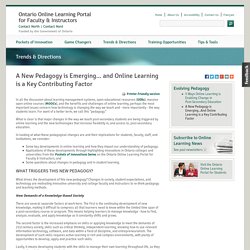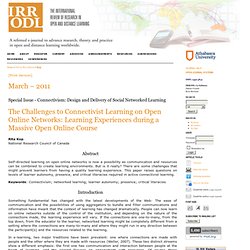

A pedagogy of abundance - Weller. Weller, Martin (2011).

Spanish Journal of Pedagogy, 249 pp. 223–236. Full text available as: The digitisation of content combined with a global network for delivery and an open system for sharing has seen radical changes in many industries. The economic model which has underpinned many content based industries has been based on an assumption of scarcity.
With a digital, open, networked approach we are witnessing a shift to abundance of content, and subsequently new economic models are being developed which have this as an assumption. Siemens - Connectivism: a learning theory for a digital age. Editor’s Note: This is a milestone article that deserves careful study.

Connectivism should not be con fused with constructivism. George Siemens advances a theory of learning that is consistent with the needs of the twenty first century. His theory takes into account trends in learning, the use of technology and networks, and the diminishing half-life of knowledge. It combines relevant elements of many learning theories, social structures, and technology to create a powerful theoretical construct for learning in the digital age. George Siemens Introduction Behaviorism, cognitivism, and constructivism are the three broad learning theories most often utilized in the creation of instructional environments.
Learners as little as forty years ago would complete the required schooling and enter a career that would often last a lifetime. “One of the most persuasive factors is the shrinking half-life of knowledge. Some significant trends in learning: Background An Alternative Theory Connectivism.
A New Pedagogy is Emerging... and Online Learning is a Key Contributing Factor. In all the discussion about learning management systems, open educational resources (OERs), massive open online courses (MOOCs), and the benefits and challenges of online learning, perhaps the most important issues concern how technology is changing the way we teach and - more importantly - the way students learn.

For want of a better term, we call this “pedagogy.” What is clear is that major changes in the way we teach post-secondary students are being triggered by online learning and the new technologies that increase flexibility in, and access to, post-secondary education. In looking at what these pedagogical changes are and their implications for students, faculty, staff, and institutions, we consider: What drives the development of this new pedagogy? Changes in society, student expectations, and technology are motivating innovative university and college faculty and instructors to re-think pedagogy and teaching methods. New Demands of a Knowledge-Based Society New Student Expectations. The challenges to connectivist learning on open online networks: Learning experiences during a massive open online course. Special Issue - Connectivism: Design and Delivery of Social Networked Learning Rita Kop National Research Council of Canada Abstract Self-directed learning on open online networks is now a possibility as communication and resources can be combined to create learning environments.

But is it really? There are some challenges that might prevent learners from having a quality learning experience. Keywords: Connectivism; networked learning; learner autonomy; presence; critical literacies Introduction Something fundamental has changed with the latest developments of the Web: The ease of communication and the possibilities of using aggregators to bundle and filter communications and information have meant that the context of learning has changed dramatically.
In e-learning, two major traditions have been prevalent: one where connections are made with people and the other where they are made with resources (Weller, 2007). Connectivism Challenges to Connectivist Learning Self-directed learning.